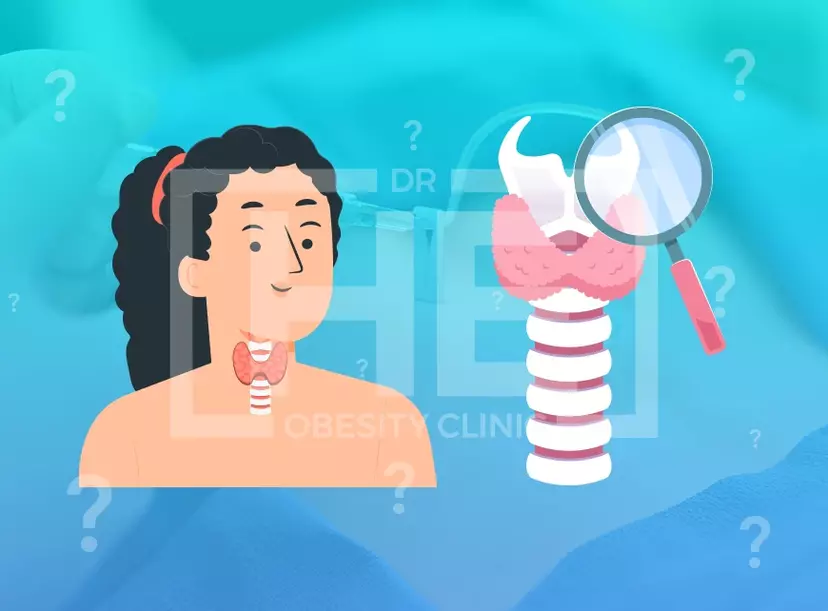What Diseases Does An Endocrinologist Treat?
What diseases does an endocrinologist treat? What does an endocrinologist treat? Do endocrinologists treat diabetes? What does the endocrine department look at? We can answer the question briefly as follows: The area of expertise of the Endocrinology and Metabolic Diseases unit is the endocrine glands in our body and the hormones they control. Endocrine glands work by secreting hormones directly into the bloodstream; It is responsible for managing many vital functions, especially sexual development, growth, and metabolic activities. The branch of medicine that studies this endocrine system is called Endocrinology, and those who specialize in this branch are called “endocrinologists”. These experts specialize in issues such as the production, balance, functions, and disorders of hormones. As can be understood from all this, Endocrinology plays an active role in the treatment of many conditions such as infertility, menopause, thyroid diseases, diabetes, obesity, and hypertension.
An endocrinologist is a medical doctor who specializes in the diagnosis and treatment of diseases related to the endocrine system. This system is responsible for producing hormones that regulate metabolism, growth and development, tissue function, sexual function, reproduction, sleep, and mood, among other things. Endocrinologists are experts in managing conditions such as diabetes, thyroid disorders, adrenal gland disorders, and more.
1. Diabetes: Diabetes is a chronic condition that affects how your body turns food into energy. There are three main types of diabetes: type 1, type 2, and gestational diabetes. Endocrinologists play a crucial role in managing diabetes by helping patients monitor their blood sugar levels, prescribing medication, and providing education on lifestyle changes such as diet and exercise.
2. Thyroid Disorders: The thyroid gland produces hormones that regulate the body’s metabolism. Disorders of the thyroid gland can lead to either an overactive thyroid (hyperthyroidism) or an underactive thyroid (hypothyroidism). Endocrinologists are trained to diagnose and treat these conditions, often through medication or other interventions to restore hormone balance.
3. Osteoporosis: Osteoporosis is a condition characterized by fragile bones that are more susceptible to fractures. Endocrinologists can help manage osteoporosis by evaluating bone density and providing treatment options to help prevent fractures and maintain bone health.
4. Adrenal Gland Disorders: The adrenal glands produce hormones such as cortisol, which helps the body respond to stress, and aldosterone, which regulates blood pressure. Disorders of the adrenal glands can lead to conditions such as Cushing’s syndrome or Addison’s disease. Endocrinologists are skilled in diagnosing and treating these disorders to restore hormone balance and alleviate symptoms.
5. Pituitary Gland Disorders: The pituitary gland is often referred to as the “master gland” because it produces hormones that regulate other glands in the endocrine system. Disorders of the pituitary gland can lead to hormonal imbalances that affect various bodily functions. Endocrinologists are trained to diagnose and treat conditions such as pituitary tumors, which can impact hormone production and lead to a range of symptoms.
6. Polycystic Ovary Syndrome (PCOS): PCOS is a hormonal disorder common among women of reproductive age. It can cause symptoms such as irregular periods, infertility, weight gain, and excessive hair growth. Endocrinologists can help manage PCOS through hormone regulation and lifestyle interventions to improve symptoms and promote fertility.
7. Hyperparathyroidism: The parathyroid glands regulate calcium levels in the body. Hyperparathyroidism occurs when these glands produce too much parathyroid hormone, leading to high levels of calcium in the blood. Endocrinologists can diagnose and treat hyperparathyroidism to prevent complications such as kidney stones and bone loss.
In addition to these specific conditions, endocrinologists also play a role in managing hormonal imbalances related to growth and development, reproductive health, and metabolic disorders. They work closely with patients to develop individualized treatment plans that may include medication, hormone therapy, lifestyle modifications, and ongoing monitoring to ensure optimal hormone balance and overall health.
What is the Endocrine System?
Hormones responsible for regulating functions such as reproduction, metabolism, adaptation to stress, and growth are secreted by various glands. The system formed by these glands is called the ‘endocrine system’. The glands we are talking about are responsible for the production of one or more hormones and also for them to enter the bloodstream and reach the target organs. The hormones in question keep body functions under control by stopping or triggering certain reactions. The main glands and organs that make up the endocrine system are:
1. Pituitary
2. Adrenals
3. Hypothalamus
4. Pancreas
5. Parathyroid
6. Thyroid
7. Adrenal glands
8. Ovaries in women and testicles in men.
What Diseases Does An Endocrinologist Treat?
What diseases does an endocrinologist treat? Problems related to endocrine glands and the chemicals they secrete, that is, hormones, are within the scope of the Endocrine unit. According to this; Benign or malignant formations (such as masses, tumors) in the glands, cancers, and situations of too little or too much hormone secretion concern the Endocrine unit. To briefly list, the areas of expertise of the Endocrine department are as follows:
1. Hormone imbalances
2. Pituitary problems such as tumors, diabetes insipidus, and insufficiency,
3. Sex hormone disorders,
4. Disorders related to growth hormone, ACTH, prolactin, FSH, TSH, LH hormones,
5. Diseases that occur in the glands due to anatomical (structural), biological and environmental reasons,
6. Cholesterol metabolism disorders,
7. Glucose metabolism disorders,
8. Parathyroid gland diseases,
9. Thyroid gland diseases,
10. Calcium metabolism diseases,
11. Failure of the adrenal glands to function at the desired level and resulting in adrenal gland diseases (Gender hormones, aldosterone, cortisol, noradrenaline and adrenaline hormone irregularities, etc.)
What Does An Endocrinologist Treat ?
What does an endocrinologist treat? Metabolic and hormonal diseases encountered in children are within the scope of this unit. After 6 years of medical education, pediatric endocrinologists also receive 5 years of specialization training in the field of child health and diseases. And also; As a minor branch, they must complete 3 years of Pediatric Endocrinology training. By detecting the hormonal and metabolic problems of individuals who have not yet entered adolescence, these specialists provide solutions with effective and permanent modern treatment methods, preventing these problems from extending into adulthood and negatively affecting their entire lives. In this way, it is ensured that children have a healthy adolescence and step into adulthood without any problems.
What Diseases Does the Endocrine Department Treat?
What is the most common disease treated by an endocrinologist? What diseases do endocrinologists treat? What diseases does an endocrinologist treat? Some of the disorders diagnosed and treated in the endocrinology department are as follows:
1. Adrenal or pituitary disorders,
2. Growth problems
3. Low blood sugar,
4. Polycystic Ovary Syndrome (PCOS) and other ovulation disorders, decrease in egg reserves,
5. Menstrual irregularities,
6. Osteoporosis and other bone diseases (For example, metabolic bone disorders such as Paget’s disease, rickets and osteomalacia),
7. Overweight and obesity,
8. Feokromasitoma,
9. Early or late puberty (Problems related to the beginning of puberty),
10. High uric acid,
11. Pituitary deficiencies,
12. Hashimoto’s disease,
13. Breast enlargement in men,
14. No beard growth,
15. Failure to develop testicles and penis,
16. Erection problems and impotence,
17. Adrenal mass,
18. Hyperandrogenism,
19. Cushing Syndrome
20. Hyperaldosteronism,
21. Cortisol elevation,
22. Addison’s disease (Adrenal gland insufficiency),
23. Pancreatic tumor,
24. Tumors occurring in the glands,
25. Hormonal changes due to andropause and menopause,
26. Metabolic syndrome,
27. Thyroid cancers, inflammations, and nodules,
28. Growth hormone excess or deficiency,
29. Problems with metabolism,
30. Diabetes (Type 1 and Type 2 diabetes and gestational diabetes), problems related to insulin resistance,
31. Eating disorders such as Anorexia Nervosa, Bulimia Nervosa,
32. Thyroid problems,
33. Triglyceride disorders and high cholesterol,
34. Infertility,
35. Lipid (blood fats) metabolism diseases,
36. Thyroid diseases such as hyperthyroidism or hypothyroidism,
37. Sexual dysfunction (reproductive) disorders in men and women caused by hormones,
38. Excessive hair growth (Hirsutism),
39. Hypertension (High blood pressure).
What Does the Pediatric Endocrine Department Look at?
In this part of our article, we have mentioned the adult specialties of the Endocrinology branch.
Now, what diseases does the Pediatric Endocrine Department treat? We can answer the question as follows:
1. Problems related to height growth (for example, short stature),
2. Acromegaly giant disease,
3. Obesity and childhood obesity,
4. Problems with weight gain,
5. Growth retardation,
6. Early or delayed puberty,
7. Childhood diabetes,
8. Mineral and water balance disorders,
9. Disorders related to phosphorus and calcium metabolism
10. Adrenal gland diseases,
11. Sex development disorders,
12. Goiter and thyroid gland disorders,
13. Pituitary gland diseases,
14. Hypoglycemia,
15. Diseases due to vitamin D deficiency.
What are the tests performed in the Endocrine Department?
In addition to physical examination, blood tests are frequently used to diagnose disorders in this area. Moreover; Radiological imaging applications such as magnetic resonance, computed tomography, ultrasound and, if necessary, biopsy are among the other diagnostic methods that can be used.




 Türkçe
Türkçe  Deutsch
Deutsch  Français
Français  Español
Español  Русский
Русский  Nederlands
Nederlands  български
български  Português
Português  Română
Română  العربية
العربية






